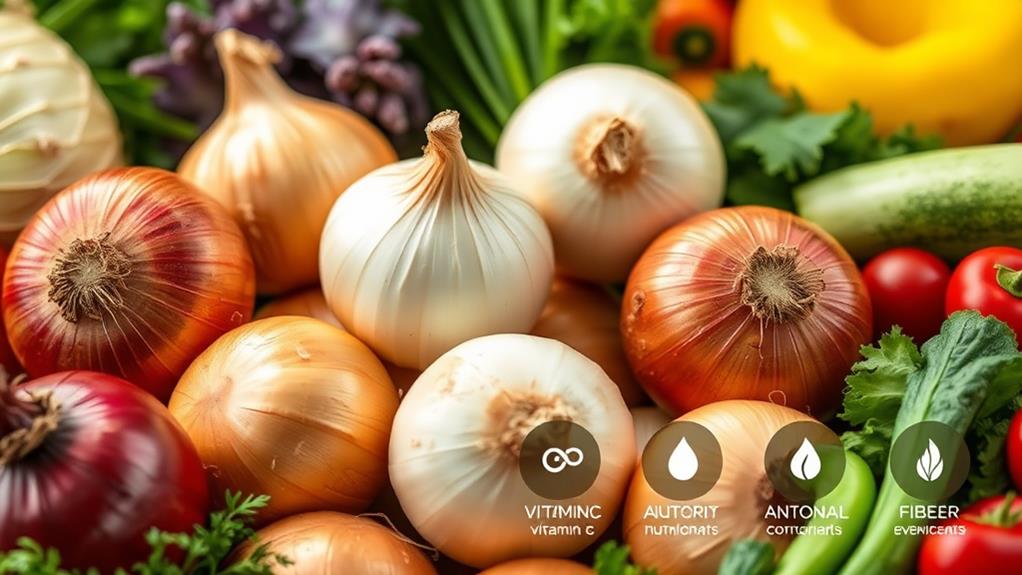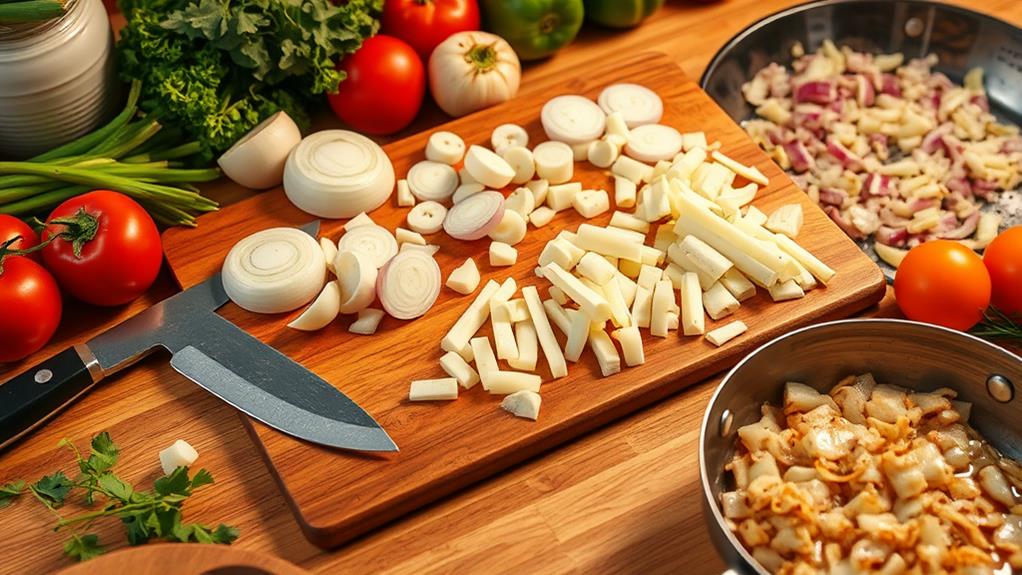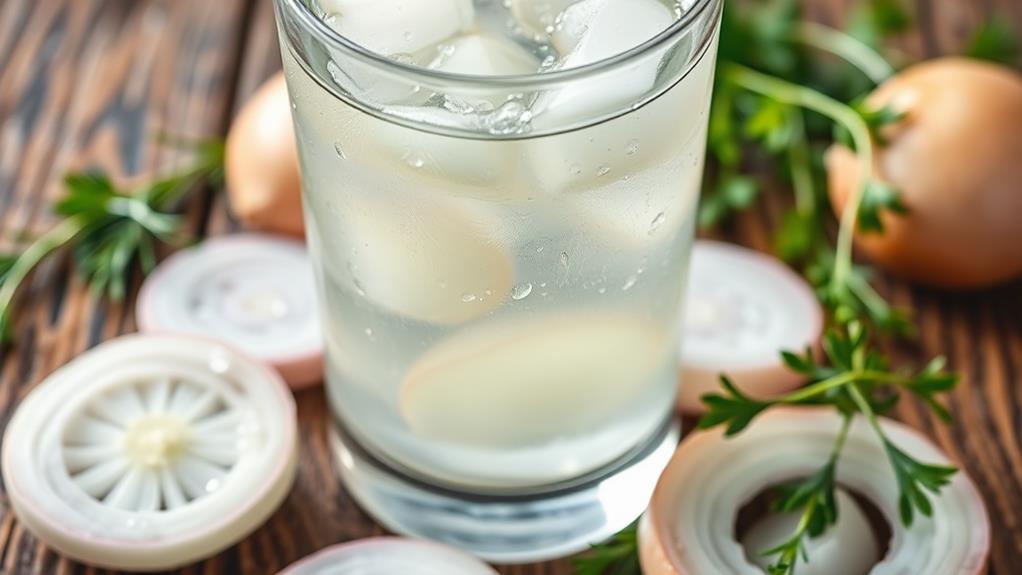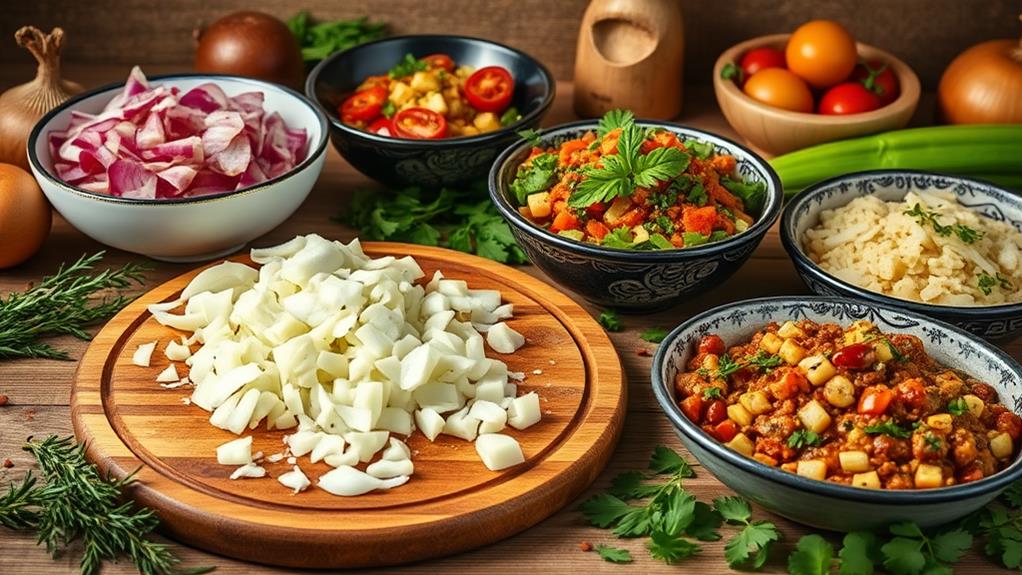If you're looking to enhance your diet, adding onions could be a smart choice. These humble vegetables aren't just flavorful; they pack a nutritional punch with vitamins, antioxidants, and fiber that can support your overall health. You might wonder how to effectively incorporate them into your meals without overwhelming your palate. Understanding their health benefits and various preparation techniques can make all the difference. So, what are the best ways to enjoy onions while maximizing their advantages and minimizing any potential downsides?
Nutritional Profile of Onions

When you add onions to your meals, you're not just enhancing flavor; you're also boosting your nutritional intake. These little wonders are low in calories, with about 44 calories in a medium onion. That means you can enjoy their taste without worrying about packing on extra pounds.
Onions are loaded with vitamins, especially vitamin C and B vitamins like folate and B6, which are essential for your metabolism and nerve function.
Don't forget the minerals! Onions provide potassium and manganese, helping your muscles work properly and keeping your bones healthy. Plus, they contain about 1.9 grams of dietary fiber, which is great for your digestive health. Fiber helps keep everything moving smoothly in your tummy!
But wait, there's more! Onions are rich in antioxidants, particularly quercetin. This powerful compound supports your immune system and helps fight off oxidative stress, which can lead to chronic diseases.
Health Benefits of Onions
Adding onions to your meals not only enhances flavor but also offers a range of impressive health benefits. These little powerhouses are packed with antioxidants, especially quercetin, which helps reduce inflammation and lower blood pressure. This can decrease your risk of chronic diseases like heart disease and cancer—pretty amazing, right?
In fact, regular onion eaters can enjoy a 22% lower risk of stomach cancer and a 15% lower risk of colorectal cancer.
Onions also support your digestive health thanks to their high fiber and prebiotic content. They help good gut bacteria thrive, which means a happy tummy!
Plus, if you're watching your blood sugar, onions can help. Studies show that eating 100g of raw red onion may lower fasting blood sugar levels for diabetics.
And don't forget about your immune function! Onions are rich in nutrients like vitamin C and B vitamins, which keep your body strong.
Cooking With Onions

Onions are incredibly versatile ingredients that can elevate a dish in countless ways. Whether you're sautéing them for a tasty base or roasting them to bring out their natural sweetness, onions add a special flavor to your meals.
Yellow onions are perfect for cooking, while red onions shine in raw dishes like salads and salsas, thanks to their mild, sweet taste.
Have you ever tried quick pickled red onions? Just soak them in vinegar, water, sugar, and salt, and you've got a tangy crunch that's perfect for sandwiches and salads.
The versatility of onions doesn't stop there; they're fantastic in soups and stews, providing depth and flavor that make these dishes comforting and delicious.
To keep your onions fresh, prepare them close to when you're serving, and if you have leftovers, pop them in the fridge. Freshly cut onions will keep longer this way.
Preparation Techniques
Cooking with onions can be a delightful experience, but knowing how to prepare them properly makes all the difference. To start cutting onions, slice off the stem end and peel away the outer skin. Next, halve the onion from root to stem before you slice or dice it for your recipe. If you're dicing onions, make lengthwise cuts, then horizontal cuts, and finish with crosswise cuts to get those neat, uniform pieces.
Now, let's tackle those pesky tears! To reduce tears while cutting onions, chill them in the refrigerator for about 30 minutes beforehand. Another trick is to leave the root end intact while you're cutting; this helps minimize sulfur release.
When it comes to storing onions, keep whole onions in a cool, dry place to maintain freshness. If you've peeled any, pop them in the fridge to avoid spoilage.
For added convenience, consider freezing chopped onions. This way, they're ready to go when you need them, and they still taste great when cooked from frozen. Happy cooking!
Onion Water and Considerations

When you soak chopped onions in water, you create what's known as onion water. While it might sound like a magic potion, it doesn't have as many health benefits as munching on whole raw onions.
Sure, it can help with hydration, but remember, it has fewer nutrients than the actual onion. If you don't drink it right away, make sure to refrigerate it!
Now, let's talk about gas and bloating. Some folks may find that onion water doesn't sit well with their stomachs, so moderation is key if you're sensitive to onions.
Also, be prepared for the side effects—consuming onion water can lead to body odor and bad breath, thanks to those sulfur compounds in onions. You might want to keep some minty gum handy!
